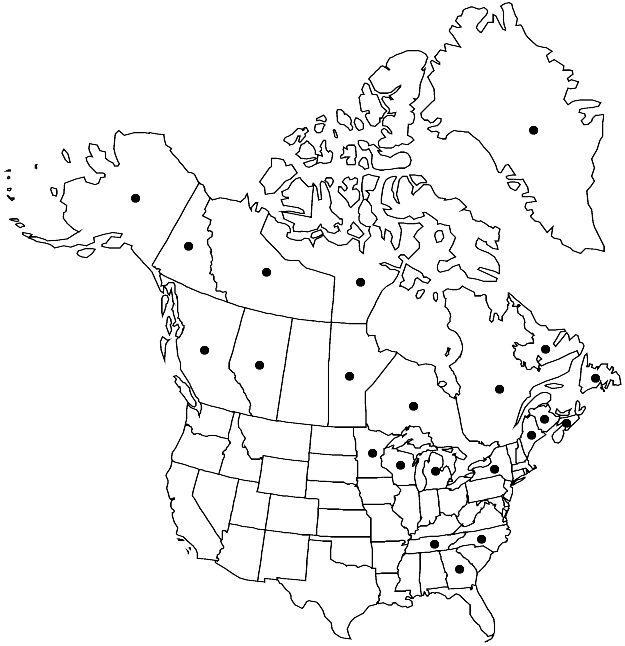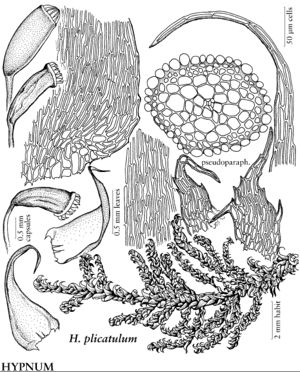Hypnum plicatulum
Ber. Thätigk. St. Gallischen Naturwiss. Ges. 1877–1878: 316. 1880.
Plants small to medium-sized, pale yellow-green to golden green. Stems 2–5 cm, yellow-green or green, occasionally brown tinged, procumbent to suberect, often regularly pinnate, branches 0.2–0.5 cm; hyalodermis present, central strand weak or absent; pseudoparaphyllia foliose, often 2-fid. Stem leaves curved to falcate-secund, ovate-lanceolate to narrowly triangular, strongly curved to insertion, gradually narrowed to apex, 1–1.5 × 0.5–0.8 mm; base auriculate; margins plane, often toothed on auriculate portion, entire or toothed distally; apex long-attenuate; costa double and short or obscure; alar cells triangular, rectangular, or rhomboidal, region usually well defined, distalmost and outermost cells pitted, sometimes reduced or absent, outermost cells with walls not thinner; basal laminal cells shorter, broader than medial cells, pigmented or walls pitted; medial cells (50–)60–70(–80) × 4–5 µm. Sexual condition dioicous (phyllodioicous). Seta red to red-brown, 2–2.3 cm. Capsule inclined, brown, cylindric, 1.5–2 × 0.7–0.8 mm; annulus 1- or 2-seriate; operculum conic; endostome cilia 2.
Phenology: Capsules mature Jul–Aug.
Habitat: Base and trunks of trees, logs, humus on cliff shelves and rock, forest floors, bog margins, tundra
Elevation: low to high elevations (0-2000 m)
Distribution

Greenland, Alta., B.C., Man., N.B., Nfld. and Labr., N.W.T., N.S., Nunavut, Ont., Que., Yukon, Alaska, Ga., Maine, Mich., Minn., N.Y., N.C., Tenn., Wis., Europe, Asia.
Discussion
Hypnum plicatulum is a predominantly boreal to Arctic species, scattered in the Northern Hemisphere and producing sporophytes infrequently in summer. Useful distinguishing features include the frequently close-pinnate stems, yellowish green to golden green leaves with green to yellow stems, stems with hyalodermis, and auriculate leaves with a few differentiated alar cells that are sometimes excavated. See also discussions under 3. H. callichroum, 10. H. hamulosum, and 11. H. holmenii. Plants of H. plicatulum have branches 0.5–1 mm wide; the leaves have five or six pigmented, thick-walled alar cells, 6–15 µm; and the endostome cilia are as long as the segments.
Selected References
None.
